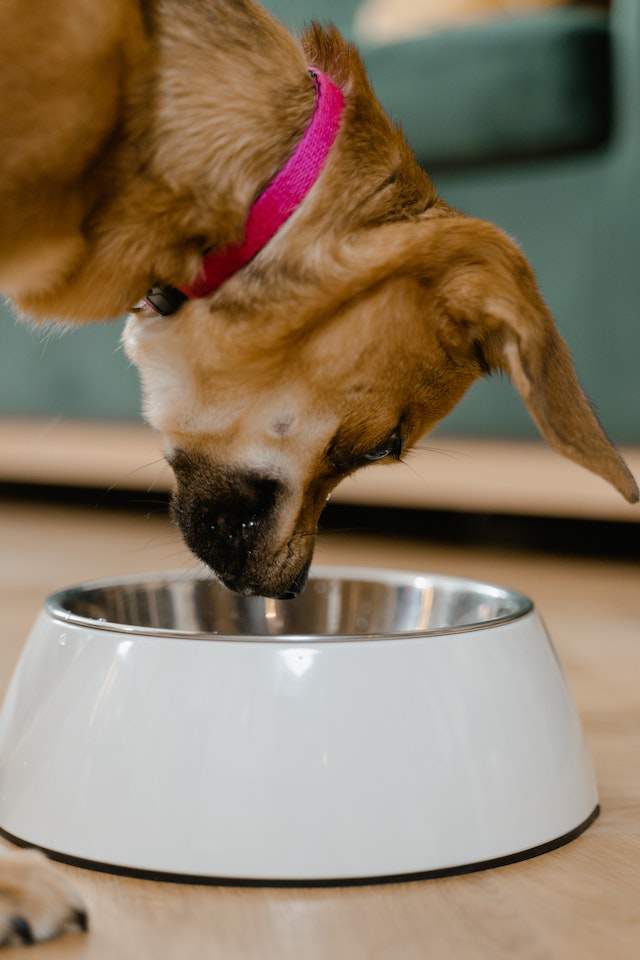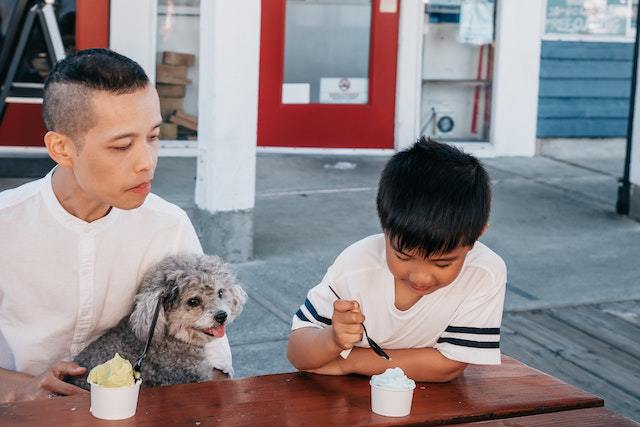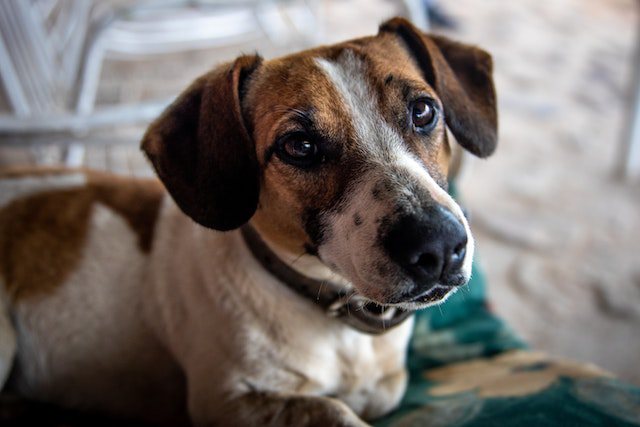10 Reasons For Dog Coughing and Not Eating

Let’s discuss the reasons for dog coughing and not eating…
If you’ve recently noticed your dog coughing and rejecting meals, it can be very concerning.
As a pet parent, it’s essential to understand the causes and probable health issues associated with dog coughing and not eating. So, we’re here to put your worries to rest with our advice and dog-care tips.
Keep reading to find out more!
Why is my dog coughing and not eating?
There could be several reasons for a dog coughing and not eating, and one possibility is that the dog is suffering from an illness or infection that is affecting its appetite, such as kennel cough or pneumonia.
Dogs with kennel cough typically have a persistent, forceful cough, while those with pneumonia are usually clearly ill, with a lack of appetite being a common symptom.
Heartworm disease, canine influenza, and laryngeal/esophageal disease are some other possible causes of coughing in dogs.
It is important to consult a veterinarian to determine the underlying cause of the dog’s coughing and lack of appetite, as prompt treatment may be necessary to resolve the issue.
Let’s break it down further…
Reasons for a Dog Coughing and Not Eating

The following are some common reasons for a dog coughing and not eating:
1. Kennel Cough
Kennel cough, also known as infectious tracheobronchitis, is a typical respiratory disease that results in a chronic dry cough, gagging, and appetite loss.
It frequently occurs in crowded or stressful settings. Most cases go away on their own without treatment, but your veterinarian may recommend antibiotics or cough suppressants to hasten your recovery.
It’s essential to isolate your dog from other dogs and reduce stress if you want to stop the spread of kennel cough.
2. Canine Influenza
Dog flu, also known as canine influenza, is a very contagious viral infection that results in coughing, sneezing, and decreased appetite.
It spreads quickly among dogs in close quarters, such as dog daycare centers or shelters.
Although vaccination is the best preventive measure, your veterinarian may advise supportive care, such as rest, hydration, and possibly antiviral medications, if your dog contracts the flu.
3. Heartworm Disease
Infected mosquitoes carry heartworm disease, which can cause coughing, exhaustion, and appetite loss in canines.
Make sure your dog takes regular heartworm preventive medication because prevention is key.
If your dog has heartworm disease, treatment can be difficult and frequently necessitates the help of a veterinarian.
To get advice specific to your dog’s needs, speak with your veterinarian.
4. Allergies
Like people, dogs can experience allergic reactions that result in coughing and decreased appetite.
Pollen, dust mites, and certain foods are examples of common allergens. The allergen must be located and removed.
Maintain a spotless environment, use hypoallergenic bedding, and think about trying an elimination diet to identify any food allergies.
To treat symptoms, your veterinarian may advise antihistamines or other allergy medications.
5. Parasitic Infections
Parasites, such as lungworms or tracheal mites, can infest a dog’s respiratory system, causing coughing and appetite changes.
Prevention through regular parasite control is essential. If your dog develops a parasitic infection, your veterinarian may recommend deworming medications, along with supportive care to alleviate symptoms and promote recovery.
Learn more about dogs shaking and not eating.
6. Gastrointestinal Upset
Coughing and appetite loss can be symptoms of digestive issues like gastritis, gastrointestinal infections, or food sensitivities.
A bland diet of boiled chicken and rice can usually manage mild cases of gastrointestinal upset, but more serious cases may necessitate veterinary treatment.
Your veterinarian can suggest suitable dietary modifications and, if required, medications to treat symptoms.
7. Respiratory Tract Obstruction
Your dog may experience coughing fits and food refusal due to foreign objects lodged in their respiratory system, such as grass seeds, tiny toys, or food.
You should seek immediate veterinary care if you suspect an obstruction. To find and safely remove the foreign object, your veterinarian may need to use imaging or endoscopy.
8. Fungal Infections
Certain fungal infections, such as blastomycosis or histoplasmosis, can affect a dog’s respiratory system, leading to coughing, lethargy, and loss of appetite.
These infections are typically acquired from inhaling fungal spores present in soil or bird droppings.
Treatment involves antifungal medications, which need to be administered under veterinary supervision.
Prompt diagnosis is crucial for successful management of fungal infections.
9. Dental Problems
Dogs may lose appetite as a result of dental problems like gum disease, tooth decay, or oral infections that can make eating uncomfortable.
Regular dental care, such as tooth brushing, dental chews, and professional cleaning appointments, can help prevent these problems.
Consult your veterinarian for a checkup and potential dental treatments if your dog exhibits any signs of dental issues.
10. Respiratory Tumors
Respiratory tumors, such as lung cancer, can cause coughing and appetite loss in dogs.
If you notice persistent coughing, weight loss, or labored breathing, it’s crucial to consult your veterinarian.
Diagnostic tests, like X-rays or CT scans, may be necessary to detect the presence of tumors.
Treatment options vary based on the type and stage of cancer and can include surgery, chemotherapy, or radiation therapy.
Learn more about dog sick symptoms.
When to Seek Veterinary Care for A Dog Coughing and Not Eating
If your dog is coughing and not eating for more than a day, appears lethargic, or has other concerning symptoms, it is important to seek veterinary care as soon as possible.
This can help diagnose the underlying cause of the cough and provide appropriate treatment.
Some possible causes of coughing in dogs include kennel cough, pneumonia, and heart disease, among others.
Your veterinarian can perform a thorough examination and recommend appropriate tests and treatments based on your dog’s specific condition.
In general, if you are ever concerned about your dog’s health, it is always best to err on the side of caution and seek veterinary care.
Home Care Tips for a Dog Coughing and Not Eating

When a dog is coughing and not eating, it can be a sign of a serious health issue, and it is important to consult a veterinarian.
However, here are some home care tips that may help in the meantime:
- Keep your dog hydrated: Offer your dog small amounts of water frequently to ensure that they stay hydrated. You can also try offering them ice cubes or low-sodium chicken broth to encourage them to drink.
- Use a humidifier: A cool-mist humidifier can help ease your dog’s coughing and make it easier for them to breathe. Make sure to clean the humidifier regularly to prevent the buildup of harmful bacteria.
- Offer bland, easily digestible food: If your dog is not eating, try offering them small amounts of bland food such as boiled chicken and rice. Avoid feeding them rich or fatty foods that could upset their stomach.
- Keep your dog calm and rested: Limit your dog’s activity levels and provide them with a quiet, comfortable place to rest. Stress and excitement can make coughing worse.
- Use cough suppressants: Over-the-counter cough suppressants designed for dogs can help ease their cough and make them more comfortable. However, it is important to consult your veterinarian before giving your dog any medication.
- Try natural remedies: There are several natural remedies that may help ease your dog’s cough, such as honey, ginger, and chamomile tea. Again, make sure to consult your veterinarian before trying any new remedies.
- Keep your dog away from smoke and other irritants: Smoke from cigarettes, candles, or fireplaces can make your dog’s coughing worse. Keep them away from these irritants and ensure that their living space is well-ventilated.
- Monitor your dog’s temperature: Keep an eye on your dog’s body temperature and watch for signs of fever. If they develop a fever, it is important to seek veterinary care.
- Be patient: It may take time for your dog to fully recover from their cough. Be patient and provide them with plenty of love and care during their recovery.
Treatment Options for a Dog Coughing and Not Eating

The best course of action would be to take your dog to a veterinarian for a proper diagnosis and treatment plan.
Depending on the underlying cause of the cough and loss of appetite, treatment options could include antibiotics, anti-inflammatory medications, cough suppressants, or other medications to manage symptoms.
Additionally, your vet may recommend changes to your dog’s diet or feeding schedule to help with their loss of appetite.
Keeping your dog hydrated is also important, so your vet may suggest providing fluids or administering fluids through an IV.
It’s important to note that the appropriate treatment option for your dog will depend on the underlying cause of their cough and loss of appetite.
Your vet will be the best source of information regarding treatment options for your specific case.
Learn more about dealing with older dogs coughing and not drinking water.
Related Questions
Can I treat my dog’s coughing and loss of appetite at home?
While some remedies like honey and steam can help soothe your dog’s cough, it’s always best to consult a professional before trying any home treatments. Not eating can lead to serious health issues in dogs, so it’s crucial to see a vet as soon as possible.
Is coughing and loss of appetite in dogs a serious issue?
Yes, it can be. If your dog is coughing and not eating for an extended period, it could be a symptom of an underlying condition that needs immediate attention. It’s always best to seek help from a vet to ensure the well-being of your pet.
Yes, sometimes it can be. Some dogs may be sensitive to certain foods, leading to a loss of appetite and coughing. Therefore, it’s crucial to choose the right type of food that is suitable for your dog’s breed, size, and age. A vet can help you choose the right kind of food for your furry friend.
Is coughing and loss of appetite in dogs contagious?
Coughing and loss of appetite in dogs are not always contagious. However, some respiratory infections like kennel cough can spread from one dog to another. It’s best to avoid contact with other dogs and take your pet to the vet for a proper diagnosis.
Can a change in the environment cause coughing and loss of appetite in dogs?
Yes, changes in environment or routine can potentially cause stress in dogs, which can lead to symptoms like coughing and loss of appetite. However, it’s crucial to rule out underlying medical conditions first by consulting a vet.
Learn more about handling a dog that is not eating while the owner is away.
Conclusion
In conclusion, it’s essential to pay attention to your furry friend’s health and behavior.
If you notice your dog is coughing and not eating, it could be a symptom of an underlying medical issue.
Don’t hesitate to take your pup to the vet to get them checked out and treated if necessary. Remember, a healthy and happy pup is a joy to have around!
